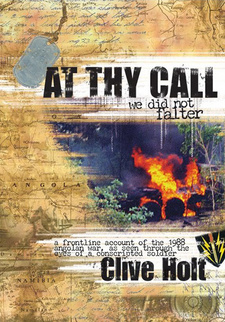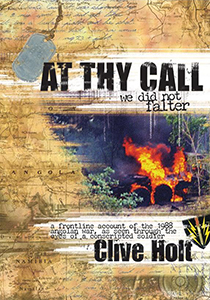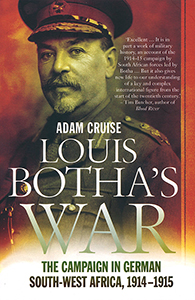At Thy Call We Did Not Falter, by Clive Holt

At Thy Call We Did Not Falter. A frontline account of the 1988 Angolan war, as seen through the eyes of a conscript soldier, by Clive Holt. Zebra Press. Cape Town, South Africa 2005. ISBN 9781770071179 / ISBN 978-1-77007-117-9
At Thy Call We Did Not Falter is a gripping frontline account of the Angolan war, as seen through the eyes of a 19-year-old conscripted soldier.
[...] I was attached to Oscar Company, which comprised of two mortar platoons, two anti-tank platoons and two assault pioneer platoons. We were told that we would be flown to an air force base in South West Africa and then transported by road to our new permanent base, 61 Mechanised Infantry Battalion, where we would receive our new Ratels and other vehicles and commence with 'bush orientation. We left Bloemfontein on 19 November 1987, and would not see civilisation or South Africa again for the next four months. 'Who left the fucking oven door open?' one of the guys in front of me said as we stepped out of the aircraft on landing. The blast of hot air coming in through the aircraft door was a result of the 42°C heat outside. It was the first thing to strike me as I stepped onto the ground. The other notable thing was how many of the troops were wearing sunglasses to combat the glare coming off the vast expanse of white sand all around us. The flight from Bloemfontein had lasted a couple of hours and, although it was not the most comfortable experience, it was one of the rare opportunities we had to relax without some corporal or sergeant bellowing in our ears and hurling their unique brands of abuse at us. The respite was short-lived, though. No sooner had our boots hit the ground than I could hear the sergeant's voice ordering us to get our balsakke (kitbags, literally translated as 'ball bags') and other equipment out of the aircraft and onto a waiting truck - your rifle stayed with you at all times, and this had been drummed into us during our training. 'Your rifle is your wife,' they used to tell us, 'she never leaves your side.' Like cattle bound for the abattoir, we were herded onto the trucks and told to find a place to sit (a full balsak actually makes quite a comfortable seat on the back of a truck). Once again it was the old 'hurry-up-and-wait' syndrome we had all become accustomed to over the past year of training - everything is urgent and you have to rush to get there, but when you arrive, you end up waiting around for something to happen. So there we were, uncomfortably squashed onto the back of a truck and sitting in the blistering African sun at Rundu airbase (located in the extreme north-eastern corner of SWA), waiting to be transported to our new border base camp at 61 Mech. But something was not right. What were we doing at Rundu, when 61 Mech lay a few hundred kilometres to the west? By that stage I was becoming quite suspicious that something strange was going on. This was confirmed when the truck convoy left Rundu and turned east, when it should have headed west. Something was amiss. After bouncing through the bush on the back of the truck for a few kilometres, I noticed a very large river ahead of us. We were heading straight for the water and, thanks to my school geography lessons, I realised that this was the river that formed the border between SWA and Angola. We were about to cross the Kavango River and enter Angola. I remember mentioning this to my sergeant, who just smiled and said, 'Yes, I know.' As if this shock was not big enough, I noticed a black man standing on the other side of the river holding a Russian-made AK47 assault rifle. He wore a green uniform, unlike any issued to the SADF or SWA Territorial Force (SWATF), and I immediately thought he must be a 'terrorist'. There was a bridge across the river, but it was not a permanent structure - it was one of those 'portable' bridges (pontoon bridge) erected by military field engineers. [...]
This is an excerpt from the book: At Thy Call We Did Not Falter, by Clive Holt.
Title: At Thy Call We Did Not Falter
Author: Clive Holt
Publisher: Random House Struik
Imprint: Zebra Press
Cape Town, South Africa 2005
ISBN 9781770071179 / ISBN 978-1-77007-117-9
Softcover, 15 x 21 cm, 230 pages, several colour photos
Holt, Clive im Namibiana-Buchangebot
At Thy Call We Did Not Falter
At Thy Call We Did Not Falter is a gripping frontline account of the Angolan war.
Weitere Buchempfehlungen
Licht und Schatten. Schauspielerin und Regisseurin auf vier Kontinenten
Licht und Schatten. Das Leben von Leontine Sagan (1889-1974) als Schauspielerin und Regisseurin auf vier Kontinenten.
Nostalgic Reflections. Short Stories about South Africa and Abroad
Paul J. J. Smith's nostalgic Reflections consist of short stories about South Africa and travels abroad with an occasion in traditional life.
Louis Botha's War
The book Louis Botha's War introduces aspects of the military campaign in German South-West Africa in 1914-1915.
South African Battles
South African Battles describes 36 military conflicts of South Africa's long history as well as the battle sites.






